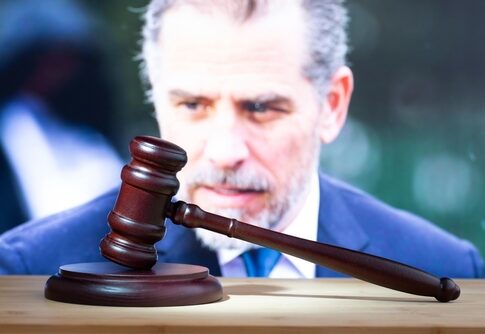Federal prosecutors are preparing for an aggressive strategy in Hunter Biden's upcoming tax trial, aiming to demonstrate how he allegedly received significant compensation from foreign interests to influence U.S. policy while his father was vice president. The trial, set to commence on September 5, follows years of scrutiny into Biden's financial dealings and tax records.
Special Counsel David Weiss, who has been investigating Hunter Biden since 2018, intends to introduce evidence showing Biden's ties to a Romanian businessman, Gabriel Popoviciu, and other foreign entities. Prosecutors allege that Popoviciu paid Biden $3 million in a bid to leverage U.S. officials to intervene in a Romanian criminal investigation against him.
The DOJ claims Hunter Biden was paid $1 million by a Romanian oligarch to "influence U.S. policy and public opinion" while his father was Vice President. Yet, they won't charge him with FARA violations?
TURLEY: "It's very frustrating for many of us who have been… pic.twitter.com/ajmzZOMcZT
— ❀ N ✿ (@8zal) August 9, 2024
The prosecution's filings indicate that Biden's business dealings with Burisma, a Ukrainian gas company, and CEFC China Energy, a Chinese conglomerate, will be part of the evidence presented. They argue that Biden performed minimal work for these entities despite receiving substantial payments, which they claim were efforts to influence U.S. public policy.
The charges against Biden include three felony counts and six misdemeanors, such as tax evasion, failure to file and pay taxes, and filing a false tax return. Prosecutors assert that Biden avoided paying over $1.4 million in taxes from 2016 to 2019 while leading an extravagant lifestyle funded by millions from his foreign business ventures.
BREAKING: The DOJ officially admits Hunter Biden was bribed by a criminal Romanian billionaire to influence U.S. policy through Joe Biden.
Now that the Biden coup is complete, they’re releasing the crimes that were going to tank his campaign. pic.twitter.com/JUi9zucRsP
— Paul Hookem (@PaulHook_em) August 9, 2024
This trial marks Biden's second federal case this year. He was previously convicted on three counts related to a firearms purchase while addicted to crack cocaine. The upcoming trial is expected to revisit personal details from Biden’s memoir, "Beautiful Things," which chronicles his struggles with addiction.
Prosecutors have highlighted that Biden's defense team attempted to exclude evidence of his foreign business activities and lifestyle, arguing it was prejudicial. However, the court has so far sided with the prosecution, allowing this evidence to be presented.
The prosecution's approach suggests a no-holds-barred strategy aimed at exposing the extent of Biden's financial misconduct.
Despite these legal battles, Biden has pleaded not guilty to all charges. If convicted, he faces up to 17 years in prison. The trial's outcome could significantly impact the political landscape, particularly as the 2024 presidential campaign heats up, potentially posing challenges for the Biden administration and the Democratic Party.


